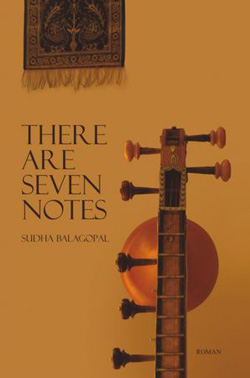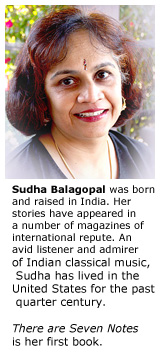

There Are Seven Notes invites you into a world you have probably never visited, that of Carnatic music, the classical music of southern India. Balagopal has woven aspects of this ancient art form into seven short stories about music, and about human relationships. No prior knowledge of music is required for reading this book but let me help you out a little. The usual Carnatic ensemble consists of a singer, a violinist, a drum and a lute, although the combination can vary. All of the music is based on a set of scales, or ragas, and each raga has seven notes, hence the title.
"Singing Lessons", the first story, deals with the bane of every music student's life—practice. Hamsa battles with both the boredom of lessons and jealousy of her new baby brother. Like many children, Hamsa's studies are the result of her parents' interest in music.
Another child, Nikhail, features in "The Music Teacher". Nikhail, an Indian-American boy, spends one summer holiday happily taking veena lessons from a distinguished teacher. (A veena is a lute-like stringed instrument.) The teacher, an elderly woman named Leela Mami, holds herself and her praise in reserve and ever so slowly a relationship develops between teacher and student. In "There Are Seven Notes", Krishnan's vision of a long-dead composer has a life-changing effect on his family. After his hallucination Krishnan gives up his concert career and causes his wife enormous anxiety.

Each story ends with a twist, none as unexpected as in "Getting Critical" where a music critic has to solve the dilemma of being at two important concerts scheduled for the same evening. Should the critic go to see the spoilt and vain Srini, or the serious, reclusive Ashok? There has long been a great rivalry between the two and neither concert should be missed. Most of the stories involve the passing down of Indian culture from one generation to the next. "Dynasty", in particular, looks at Suresh, a third-generation classical musician who chooses to forgo his concert career to take an engineering job in the USA. Suresh's father disowns him and the son wonders if he will ever see the father again.
The stories vary in quality from the rather trite "Priya's Pursuit" to my favourite, "Ravi's Ragas". This latter tale is set in the USA where Vani attends a concert at which her former duet partner performs. As Vani listens she reminisces about the euphoria of performance:
As well as the music, there are many glimpses into Indian culture—societal demands, fragrances, exotic clothing, aromatic foods, and family life are integral to each story.
But ultimately the music triumphs through the passion of those who play it and those who love to listen. Between drafts of this review I saw a documentary on television that showed Yehudi Menuhin and Ravi Shankar playing Carnatic music. It was wonderful. If not for There Are Seven Notes I would have had little understanding of what they were engaging in. As a friend of mine recently wrote: "Who says you can't learn anything from reading fiction?"


Amanda Meale is a graduate of the Sydney Conservatorium of Music, The University of Sydney.
Readers intrigued by the veena and Indian Carnatic music mentioned in this book and review can explore the music of veena virtuoso,
Nirmala Rajasekar, whose picture appears on our
homepage. We include a musical clip here, which can also be heard on Ms. Rajasekar's website (if it doesn't appear immediately, it may just need a
few minutes to load).